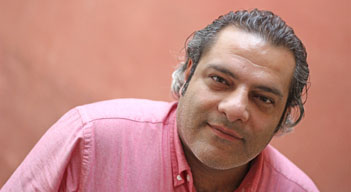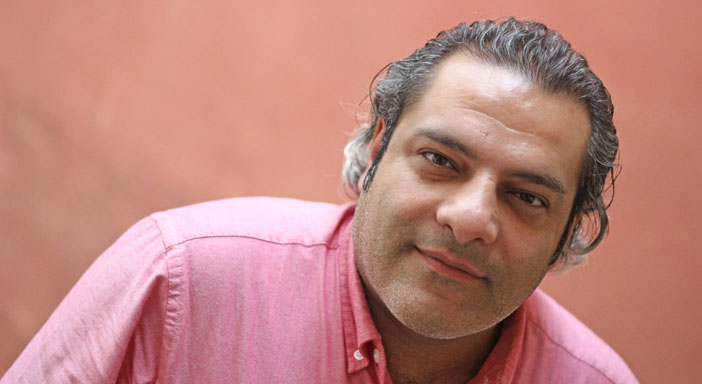‘2015’e doğru Türkiye daha samimi bir çaba içinde’


Boğaziçi Üniversitesi ve TÜSİAD işbirliğiyle, ‘1915 Trajedisini Yüzüncü Yılında Tartışmak: Anlam, Hafıza ve Siyaset’ başlıklı bir konferans düzenlendi. 11 Kasım’da düzenlenen konferansın konuşmacılarından biri de Bentley Üniversitesi’nden Asbed Kotchikian’dı. Sunumunda, Türkiye’nin soykırımı kabulü konusundaki farklı görüş ve yaklaşımları, yüzüncü yıl ve Türkiye ile diyaloğa geçme konusunda Ermeni çevrelerin öne sürdüğü beklenti ve talepleri çerçevesinde, ABD Ermenilerinin görüşlerini ortaya koyan Khotchikian’la, ABD’deki Ermeni Diasporası’nın soykırımın yüzüncü yıldönümüne bakışını ve Türkiye’nin 1915’e yaklaşımındaki değişikliği konuştuk.
Fotoğraf: Berge Arabian
Türkiye’nin Ermeni Diasporası konusunda hangi noktalara dikkat etmesi gerektiğini düşünüyorsunuz?
Konuşmamda da belirttiğim gibi, Ermeni tarafı ‘soykırım’ sözcüğü kullanılmadan Türkiye’ye doğru adım atma konusunda isteksiz olacak. Ayrıca, Ermenistan’a göre ekonomik ve siyasi olarak daha güçlü olan Türkiye’nin, haksızlık gibi görünse de daha fazla taviz vermesi ve Ermenilere yönelik olarak daha fazla güven artırıcı önlem alması gerekir. Ayrıca Diaspora, soykırımı Balkanlar’dan ve Kafkaslar’dan gelen Müslüman nüfusun trajedisiyle bir tutma yaklaşımını da reddediyor. Çünkü bu durum, birbiriyle ilgisiz iki konuyu eş tutarak, Osmanlı İmparatorluğu’nda Ermenilere yönelik soykırımın uygulanışına dair ortam ve koşulların algılanışını zayıflatıyor. Son olarak da, Türkiye’nin Dağlık Karabağ sorununda Azerbaycan’ın yanında taraf olması, zaten çok karmaşık olan Türk-Ermeni ilişkilerine daha sıkıntılı bir katman ekledi. Sorunu, Ermeni-Azeri ilişkilerine bağlamak, Türk-Ermeni ilişkilerinde de ciddi bir atılım yapmayı engelliyor.
Türkiye’nin 2015 politikası konusunda, ABD’deki Ermeni Diasporası’nın rolü için neler düşünüyorsunuz?
Amerika Ermeni Ulusal Komitesi (ANCA) ve Amerika Ermeni Birliği (AAA) gibi grupları da içeren organize ABD Diasporası, her zamanki ilkesine uygun olarak hareket ediyor. Bu da, Türkiye’nin soykırımı kabulü konusunda baskı yapılması için üçüncü bir tarafı, yani ABD’yi devreye sokma anlayışıdır. (IŞ)İD’in yükselişi gibi, Suriye ve Irak’ta yaşanan son gelişmeler ve Türkiye’nin koalisyon güçlerine destek vermekle ilgili çekingen tutumu, Ermeni grupların ABD hükümetine Türkiye’nin güvenilmez bir ortak olduğu ve soykırımın kabulü konusunda baskı yapılması gerektiğine dair bir ‘kanıt’ olarak gösteriliyor.
2015 sizin için yalnızca sembolik bir tarih mi, yoksa gerçekten bir milat olabilir mi?
100 yıl sembolik bir süre olsa da bir asır boyunca devam eden bir adalet arayışını simgeliyor. Büyük bir konferans ya da gösteri gibi birtakım geniş çaplı etkinlikler dışında, 2015’in önceki yıllardan ya da 2016 ve sonrasından farklı olacağından şüpheliyim. Tartışmalar, soykırımın tanınmasından yavaş yavaş da olsa tazminat gibi konulara doğru ilerlese de, Türkiye’nin, Osmanlı döneminde uygulanan Ermenileri yok etme politikalarının sorumluluğunu almamasından doğan adaletsizlik duygusu, Diaspora için asıl itici güç olmaya devam ediyor.
Türkiye’nin 1915 politikasındaki değişimi hakkında ne düşünüyorsunuz?
TÜSİAD ve Boğaziçi Üniversitesi’nin ortaklaşa düzenlediği etkinliğe katıldıktan sonra, Türkiye’de, Diaspora’nın 2015’le ilgili taleplerini anlamaya yönelik ilgi olduğu izlenimini edindim. Başka bir deyişle, Türkiye’de, yaklaşan yüzüncü yıldönümüne doğru patlamanın şiddetini azaltabilir miyiz ya da en azından bu patlamaya karşı hazırlıklı olabilir miyiz endişesi var. Ermenistan ve Ermenilerin, Türkiye’den ne istediğini anlamaya dair büyük ilgi, geçtiğimiz on yılda Türkiye’de yaşanan değişim sürecinin bir parçası. ‘Soykırım’ kelimesini kullanmayı reddetmek gibi basmakalıp düşünceler ve koşullar devam ediyor olsa da Ermenilerle ve Ermenistan’la ilişkileri normalleştirmek için daha sahici bir çaba içinde olunduğu da görülüyor. Türkiye’nin karşısındaki zorluk, bunun nispeten yeni bir süreç olması ve gerek hükümetin, gerekse sivil toplumun büyük bir değişimden geçiyor olması. Ermenilerin tarafındaysa, Türkiye’nin bu meseleyle ilgili ağır adımlar atıyor olmasından kaynaklanan ve giderek artan bir sabırsızlık var. Dahası, Türkiye’nin attığı herhangi bir adım, Ermeniler tarafından genellikle yetersiz ve samimiyetsiz olarak görülüyor.
Asbed Kotchikian kimdir?
Profesör Asbed Kotchikian, Bentley Üniversitesi Küresel Çalışmalar Bölümü’nde 15 senedir Ortadoğu ve Sovyetler Birliği üzerine dersler veriyor. Bu iki bölgede de uzun süre yaşamış ve seyahatlerde bulunmuş olan Kotchikian, kimlik, ulus aşırı grupların (Diaspora) dönüşümü, küçük ve zayıf ülkelerin dış politikası, Ortadoğu ve Avrasya’daki bölgesel gelişmeler gibi konularda çok sayıda makale yazdı, dersler verdi ve konferanslar düzenledi. ‘Küçük Devletlerin Diyalektiği: Ermenistan ve Gürcistan’da Dış Politika Yapmak’ kitabının yazarı olan Asbed Kotchikian, şu an hakemli akademik bir dergi olan ‘Armenian Review’ün editörlüğünü yapıyor.




